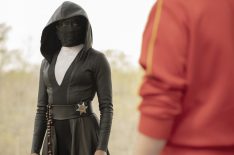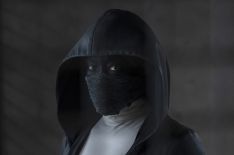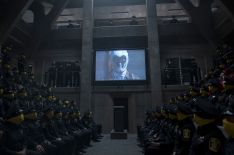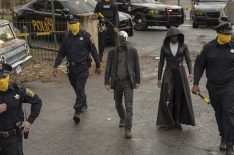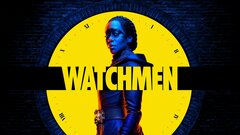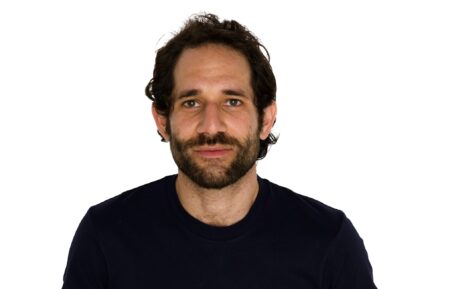‘Watchmen’ Introduces a Different Kind of Superhero Story in the Premiere (RECAP)
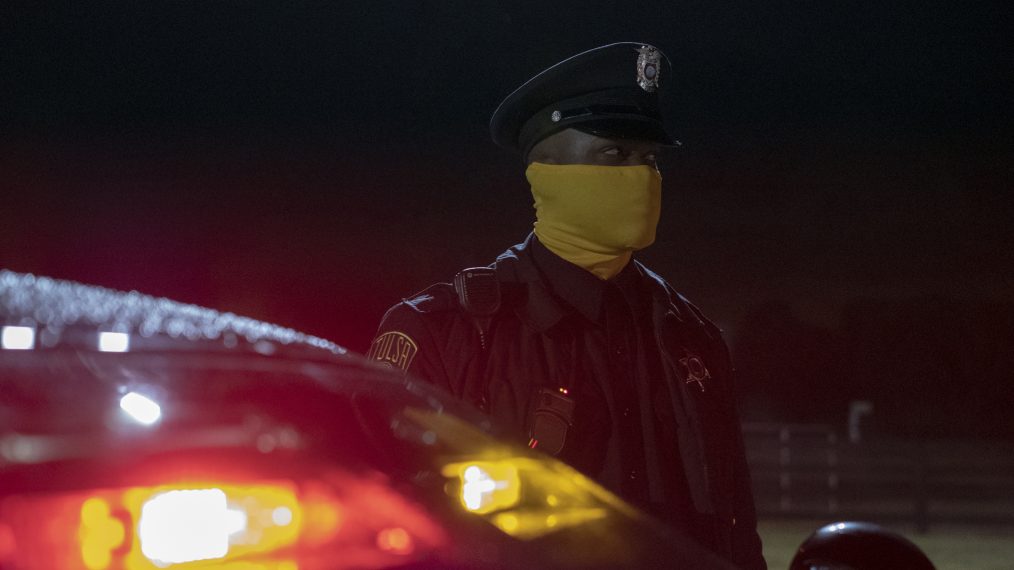
Spoiler Alert
[Warning: The below contains MAJOR spoilers for Watchmen Episode 1, “It’s Summer and We’re Running Out of Ice.”]
It’s immediately apparent that Damon Lindelof’s Watchmen isn’t going to be your standard superhero fare. As a matter of fact, if it weren’t for the masks, it’d be hard to tell from the premiere that this was a superhero show at all. It’s certainly not the flashy, sexy, action-packed spectacular you’d see over at The CW. Watchmen is dark and visceral. It’s grounded in grim reality—even if what we’re being presented is an alternate reality. As someone who is severely burnt out on superheroes, this comes as a welcome change of pace—though it’s easy to see why a particular subsection of comic book fandom might think otherwise.
Watchmen is one of the most famous and critically acclaimed comic books of all-time. The 12-issue series, written by Alan Moore and illustrated by Dave Gibbons, was published in the 1980s and pushed the boundaries of comic book storytelling with its political edge and gritty reimagining of the masked vigilante. There is such high regard for the series and its characters that it will probably come as a shock that the classic Watchmen are sidelined to background dressing or absent entirely in Lindelof’s new series (at least in the premiere).
I only have a passing familiarity with the original comic book (and Zack Snyder’s contentious 2007 movie adaptation), therefore I’m not coming into this series with any baggage or attachments to certain characters. For example, it doesn’t bother me that the character of Rorschach is now being used as a symbol of white supremacy in the same way it might upset fanboys in the IGN comment section. In fact, it makes perfect sense to me that a 2019 version of Watchmen would revolve around twisted rhetoric, racial tension, and homegrown terrorism.
Honestly, it shouldn’t come as a surprise to anyone, whether OG fan or newbie, that this Watchmen is profoundly political. It’s entirely in keeping with the tone of the comic book. Moore’s Watchmen was set in an alternate version of the 1980s where Nixon-era politics reigned supreme, and Cold War tension between the US and the Soviet Union had the world on the brink of all-out nuclear apocalypse. Lindelof’s story takes place some 30 plus years later in a politically divided and increasingly violent America, where war is waged between neighbors. Both versions share similarities in their reflection of the social climate and cultural anxieties of the time.
The season premiere begins in 1921, in Tulsa, Oklahoma, with a real-life tragedy—which for decades the history books largely omitted. As a young African American boy (Danny Boyd Jr.) watches a silent movie about Bass Reeves (the first Black Marshal of Oklahoma), a bloody race riot erupts outside the theater. Mobs of white residents descend on the Greenwood neighborhood with fire and fury. Black citizens are beaten and killed while local businesses are reduced to rubble—at the time, the Greenwood district (nicknamed “Black Wall Street”) was the wealthiest black community in America.
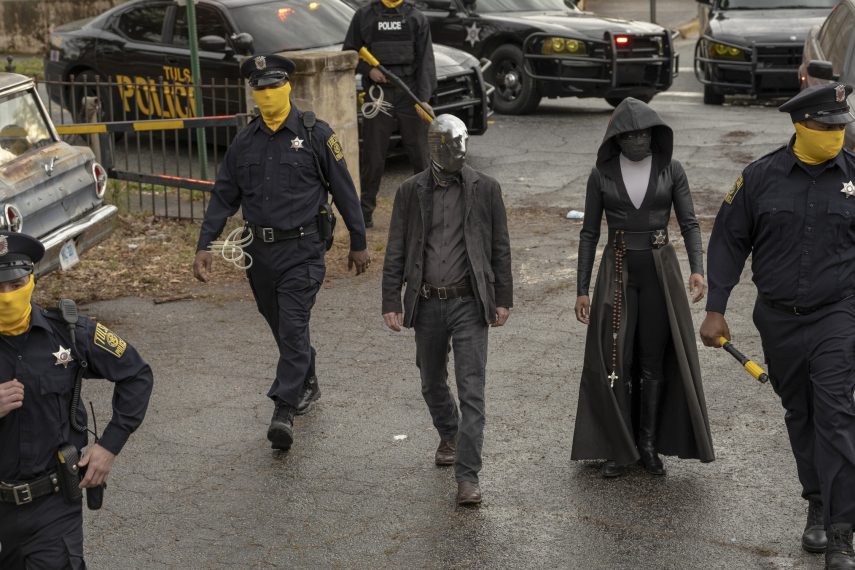
HBO
Whatever you may think of Lindelof and his writing style, there is no doubt that the man knows how to open a series with a bang. A wounded Jack waking up in the middle of the jungle in Lost and the disappearing baby in The Leftovers are both powerful introductions that instantly capture the audience’s attention. This Watchmen intro might lack the mystery and intrigue of those openings mentioned above, but it has a similar quality of making you not want to take your eyes off the screen.
There is one big question here though: Why are we in Tulsa, and what does any of this have to do with the Watchmen? The premiere doesn’t provide a full picture, but it does begin to build the framework. Tulsa of 2019 is just as racially charged and riotous as it was some 98 years ago. This is a United States where the President is actor Robert Redford (unseen)—a progressive liberal whose policies include reparations for African Americans and six-month waiting lists on the purchase of guns. It’s an America where cops have to receive clearance from dispatch to use their weapons. “THE FUTURE IS BRIGHT,” reads a placard in downtown Tulsa, but the future is also fraught with tension.
The inciting incident, which the first episode revolves around, is the shooting of a black police officer by a member of a racist terrorist group known as the Seventh Kalvary. The Seventh-K is a sort of modernized version of the KKK who hide behind inkblot masks and take their look and ideology from the infamous vigilante detective Rorschach. Perhaps the most iconic Watchmen character, the presumably dead Rorschach was a defiant loner whose worldview probably leaned right-wing by today’s standards, though he was never a white supremacist. However, it’s not difficult to imagine how his image and beliefs could be manipulated for political gain—it’s something that has happened throughout history; remember, the swastika was originally a symbol of peace.
But it’s not just the terrorists who wear masks in this world. The police disguise their faces too—a defensive measure which was taken after the Seventh-K led a mass assault on members of law enforcement, tracking them down to their homes. Now, with a comatose cop in the hospital and the Seventh-K back on the scene, the Tulsa PD get to work on the investigation. That means we’re treated to bloody backroom interrogations and cattle farm shootouts led by our team of masked detectives (a new reality show coming soon to FOX)—all of whom are brand new Watchmen characters.
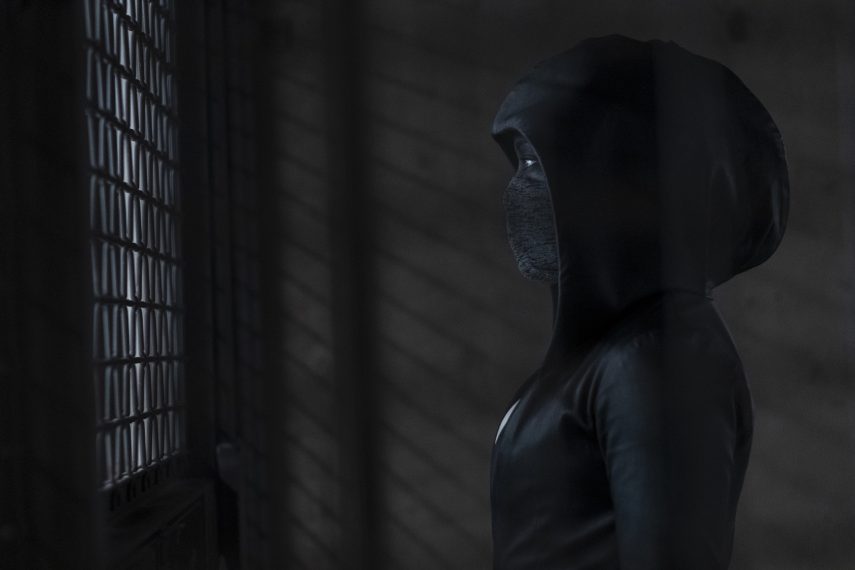
HBO
Leading the pack is Angela Abar (Regina King): to the outside world, a retired police officer and now budding baker. By all appearances, she is a family person, utterly devoted to her three kids and her loving husband. But by night she is Sister Night, a badass crime-fighting cop who dresses like an S&M nun. She’s flanked by the mirror-masked Looking Glass (Tim Blake Nelson) and affable Police Chief Judd Crawford (Don Johnson)—the only member of the force who doesn’t hide his appearance (a warning sign of his tragic fate by the end of the episode).
I can understand the reluctance to accept these new faces—the Watchmen title brings with it an expectation of the familiar. But these new characters are interesting in their own right, especially Angela, who is played with vivacious energy by recent Oscar winner—and Leftovers alum—Regina King. Angela comes fully loaded with a compelling confidence—whether she’s laying the smackdown on criminals or getting freaky with her hot-hubby. She is a woman carving her own path in a restless society, and there’s just enough sense of a secret past to provide some intrigue.
It’s in creating these dynamic characters where Lindelof truly shines. Whatever criticisms you might have of Lost, you can’t deny it featured a diverse and engaging cast of characters (plus Nikki and Paulo). You felt for those characters and rooted for them even in the most absurd situations. It’s something that so many of the post-Lost rip-offs got wrong—they put mystery above character as if a high-concept alone was enough. Lindelof achieved similar success with his characters in The Leftovers—what I consider to be one of the greatest TV shows of the past decade. So what I’m saying is, it doesn’t matter if the characters are old or new, I trust Lindelof to make them interesting and relatable.
That’s not to say the original Watchmen characters are ignored completely. Those guys are there if you look closely. The mise-en-scene of the premiere not only creates a sense of time and space, but it helps expand the universe. Moore’s comic book was praised for its structure and use of supplemental fictional documents, such as newspaper clippings and in-story comics, to reveal broader themes and backstory information. Lindelof nods to that storytelling approach here as newspaper articles and background TV reports drip-feed details of a larger story.
A news bulletin shows blue-skinned, naked god-figure Doctor Manhattan on Mars (a direct reference to the comic book). There are frequent commercials for a show-within-show, American Hero Story, a sensationalist drama series about the Minutemen—a superhero group that came before and inspired The Watchmen. And a front-page headline declares the death of wealthy humanitarian Adrian Veidt (anti-hero Ozymandias). A later scene reveals who we presume to be Veidt (Jeremy Irons) very much alive and living in virtual solitude in a countryside castle with his live-in servants.
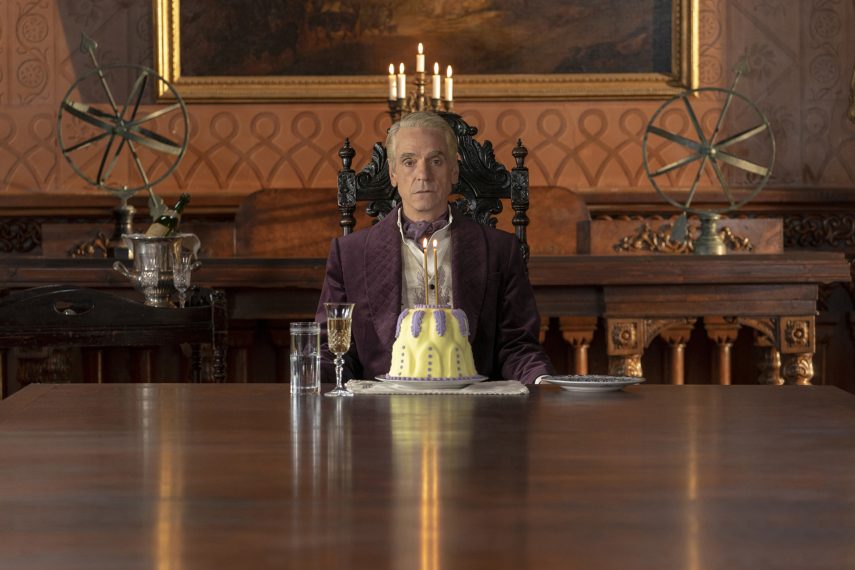
HBO
All of this is to say, the original Watchmen haven’t been forgotten, nor have the events of the comic book been erased. Early in the episode, an air raid siren blasts through the streets of Tulsa—a warning of an incoming squid storm. Angela wipes the squid splatter from her windshield as if this is a common occurrence, as normal as de-icing the car during winter. It’s a small moment, but Watchmen fans will understand the reference to the giant squid monster that Veidt let loose on New York City at the conclusion of the comic book.
If there’s one minor quibble I have with this premiere, it’s that it’s all a little bit too dark and heavy. That is understandable, to a point, given the subject matter. But what made a show like The Leftovers so enjoyable was how Lindelof injected humor and comical absurdity to break up the misery. There are brief signs of that here, like Angela and Chief busting into a fit of laughter following the spaceship crash, but it’s limited. Hopefully, that is something that will develop over time; after all, the first season of The Leftovers was bleak AF.
The premiere fills me with a lot of hope for the series, though, even if there is a pervading sense of hopelessness to the story itself. It doesn’t look or feel like most other superhero shows and is not concerned with dealing strictly in nostalgia. Lindelof’s Watchmen is a new story with new characters while still acknowledging the franchise’s history. It’s both allegorical and intriguing and above all else, highly entertaining.
Additional Notes
-So we say goodbye already to our genial, musical-performing, coke-snorting Police Chief. We barely knew ya! He was seemingly lynched by the mysterious old man in the wheelchair. I’m not entirely sure who this old man is supposed to be, though he was holding the note given to the African American boy back in 1921. It can’t be that same boy, though, surely he’d be dead by now? Maybe the baby the boy discovered in the field? But even that baby would be nearly 100-years-old by now.
-During Angela’s introduction, she mentions that she was born in America’s 51st state: Vietnam. In the comic book, President Nixon uses Dr. Manhattan to help ensure U.S. victory in the Vietnam War in 1971, and by the mid-80s, the country is declared an official U.S. state.
-For some reason, Veidt’s servant doesn’t know the difference between a knife and a horseshoe.
-There is a reference to the Seventh-K designing a “cancer bomb,” which I suspect will be a continuous plot point of the series.
Watchmen, Sundays, HBO.

